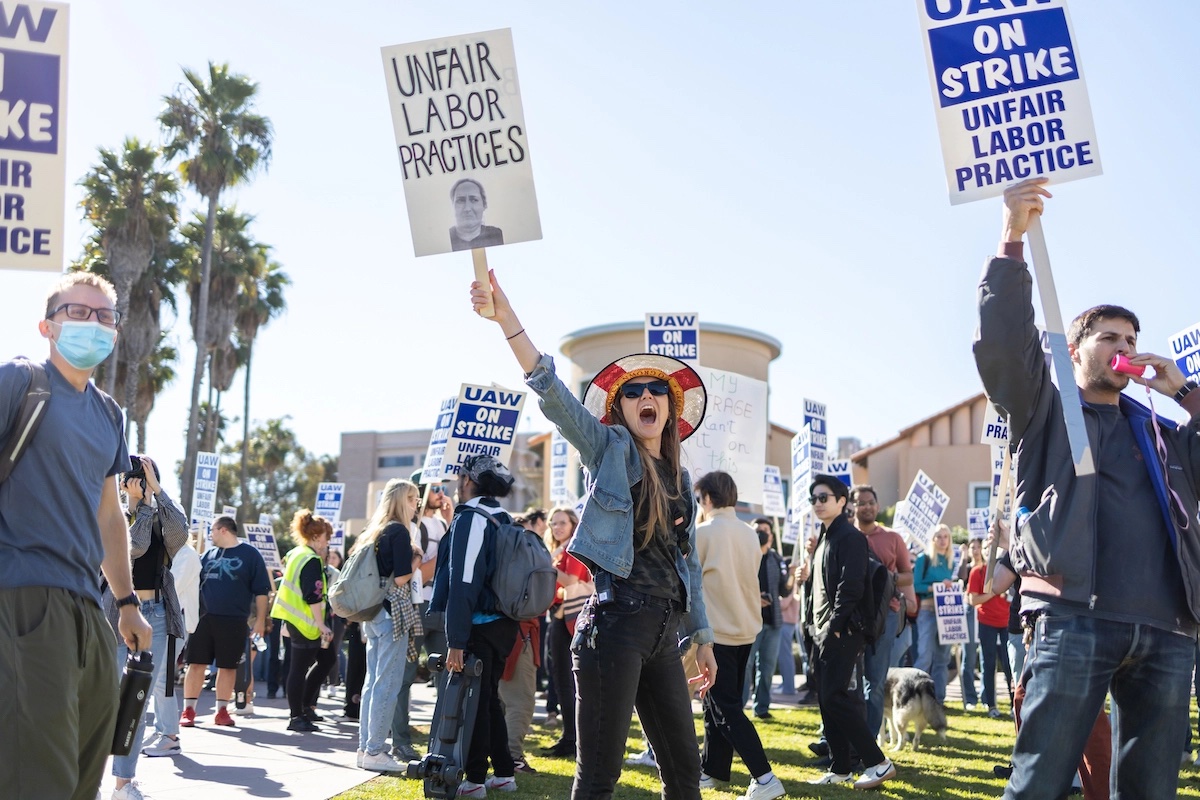Tensions Brewing over Deal to End UC Academic Workers’ Strike
UC Santa Barbara’s Bargaining Team Members Vote No on Tentative Agreements, Rally Others to Strike Them Down

After a month of protests, rallies, and back-and-forth negotiations, all four union bargaining teams representing 48,000 striking UC student employees have reached agreements with the university. However, some student workers, including at UC Santa Barbara, where the cost of living is one of the highest among UC campuses, are not yet willing to ditch the picket line or the bargaining table.
Technically, all that’s left for the strike to officially end is for graduate student researchers and academic student employees — including teaching assistants, tutors, and readers — to ratify their new contracts, which were announced on December 16. But, of course, it’s not that simple.
Fifteen out of 37 voting bargaining team members voted no on the tentative agreement, including four alternates, at UCSB, UC Riverside, UC San Diego, UC Santa Cruz, and UC Merced. The vote at UCSB was 100 percent, with all four bargaining team members voting no.
“I voted no on this tentative agreement because the wages that it enshrines will still leave myself and all of my colleagues rent-burdened and does not actually enshrine any material changes in living conditions or financial circumstances for myself and my coworkers,” said Janna Haider, recording secretary at UCSB for UAW 2865, the bargaining team representing academic student employees.
Haider, along with 20 other UC workers statewide who are against the contracts, signed an opposition letter on December 16 in response to the agreements in a campaign to kill the tentative agreement and return to the bargaining table.
The letter states that it is their “belief that the UC’s mediated proposals fail to deliver on the major demands of the strike,” including meaningful raises that address the cost of living, non-residential supplemental tuition remission, less barriers for workers needing accessibility accommodations, and sufficient childcare subsidies and healthcare for dependents. In addition, according to a press release from those unit members, “hourly workers (graders, readers, tutors) would see only a $1.50 bump in hourly pay.”
Despite this, many union members, like Joe Costello, a graduate student researcher in UCSB’s Physics Department, expressed hope that the contract would be ratified.
“I think it’s a significant win, especially for student researchers,” Costello said. “People in my position will be making $50k a year in October 2024. This doesn’t eliminate the rent burden or solve every problem that we as graduate students at Santa Barbara have, but it does represent a significant step forward, with really unprecedented raises and protections against bullying.”
Sign up for Indy Today to receive fresh news from Independent.com, in your inbox, every morning.
Haider said that student researchers currently do not have a union negotiated contract, so for those student workers, there are different stakes. “But I would also say that for the academic student employees, we won’t receive any wages increased immediately upon ratification,” she continued. “The next wages increase that we get, which will, in theory, apply on April 1, will be a raise from about $23,000 pre-tax to about $25,000 pre-tax, which will be a monthly increase of $200, which is negligible. Several of my colleagues have said to me, to each other, and on their social media accounts that they didn’t go on strike for five and a half weeks to get a $200 raise.”
The ratification vote began Monday and will conclude this Friday. If a simple majority of the 36,000 union members still on strike vote to ratify, the contracts will be effective through May 31, 2025, and both parties will be able to leave the bargaining table behind, at least for the time being.
If the contract fails, and unit members do have the opportunity to return to bargaining, then both parties would have the chance to revert to previous bargaining positions.
“That means that we could reopen some of our earlier wage demands — $40,000, possibly higher — and rethink our bargaining strategy a little bit because the current majority of the team made some strategic decisions that I did not agree with and voted against,” Haider said. “We certainly don’t expect that the university will just agree to all of our initial demands. But what we do need to see is some sort of new meaningful change in the financial realities in which we live. I currently pay 49 percent of my income to my landlord. It’s not acceptable, and as inflation continues to rise, our wages have to keep up with the cost of living.”
New, five-year contracts for UC postdoctoral scholars and academic researchers were ratified on December 9, and that same day marked the shift to voluntary mediation for negotiations between the UC and the bargaining teams representing graduate student workers.
The parties’ chosen mediator, mayor of Sacramento Darrell Steinberg, congratulated both sides for reaching the agreements, despite controversy among union membership. “Together, they reached a principled solution to end the difficult impasse,” he said.
If the contracts are not ratified, Haider said it’s uncertain whether Steinberg will continue as mediator. “At some point during mediation, he did tell us that if we demanded anything else, he would walk,” Haider said. “And if we vote down this contract and resumed bargaining, I assume that constitutes asking for something else.”
Should the strike officially end, then come January, academic student workers will return to their teaching and research. But the end may not be so soon. Those in opposition of the contracts said that, on their campuses, they’ve observed “firm commitments … toward a long-haul strike, we think that there is still more to be won, and that we still have the capacity to win it.”
Support the Santa Barbara Independent through a long-term or a single contribution.



